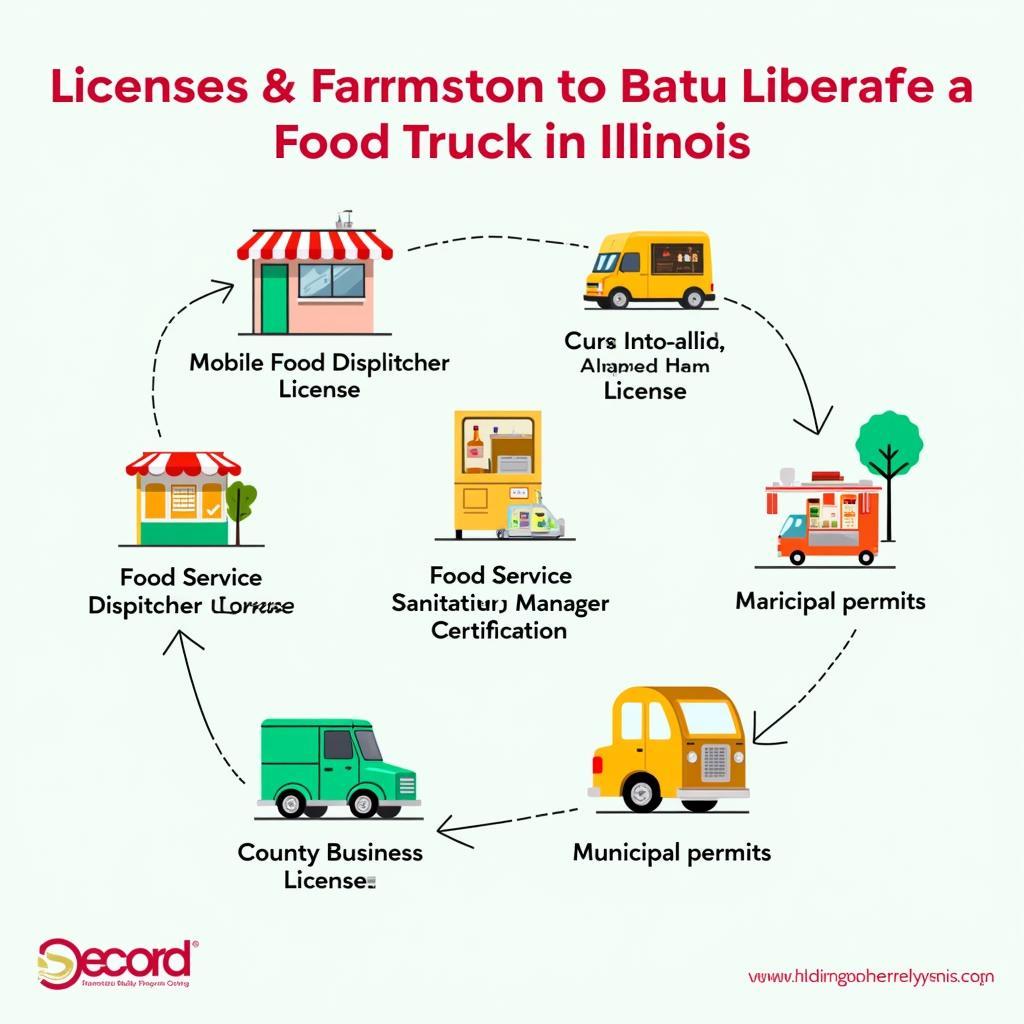Starting a food truck business in Illinois? You’re in for a treat! The food scene here is vibrant and diverse, with plenty of hungry customers eager to discover their next favorite meal on wheels. But before you hit the gas, it’s crucial to familiarize yourself with the ins and outs of Illinois Food Truck Laws. Navigating the legal landscape ensures a smooth journey and helps you avoid any unexpected bumps in the road.
Illinois Food Truck Licensing Requirements: Getting Your Permits in Order
Obtaining the necessary permits and licenses is the first order of business. Illinois requires food truck owners to acquire several licenses and permits at both the state and local levels.
State-Level Requirements
-
Mobile Food Dispatcher License: This license is obtained from the Illinois Department of Public Health (IDPH) and is mandatory for all food trucks operating in the state.
-
Food Service Sanitation Manager Certification: At least one person on your team who handles food must have this certification, demonstrating knowledge of food safety regulations.
Local Regulations: County and Municipal Permits
-
County Business License: Check with the specific county where you plan to operate your food truck for their business licensing requirements.
-
Municipal Permits: Each city or town within Illinois has its own set of regulations for mobile food vendors. These might include:
- Mobile Food Vendor License
- Fire Safety Inspection Certificate
- Zoning Approval
 Illinois Food Truck Permits Required
Illinois Food Truck Permits Required
Navigating Food Safety on the Go: Illinois Food Truck Regulations
Maintaining top-notch food safety standards is paramount, especially in a mobile environment.
The Ins and Outs of Your Food Truck: Meeting Health and Safety Standards
-
Food Handling and Preparation: Your food truck must have adequate facilities for handwashing, food prep, and temperature control to prevent contamination.
-
Waste Disposal: Proper waste disposal systems are essential to maintain hygiene and comply with regulations.
-
Regular Inspections: Be prepared for regular inspections from your local health department to ensure you are adhering to food safety protocols.
Parking Your Food Truck in Illinois: Understanding Zoning Laws
Finding the perfect spot to park your culinary haven on wheels requires understanding local zoning ordinances.
Where You Can and Cannot Park: Decoding Zoning Restrictions
-
Restricted Zones: Some areas may have restrictions on where food trucks can operate, especially near brick-and-mortar restaurants.
-
Special Events and Festivals: Participating in events and festivals can be lucrative, but make sure you obtain any necessary permits and permissions.
-
Private Property: Setting up shop on private property requires permission from the property owner and might involve additional considerations.
Insurance Coverage for Illinois Food Trucks: Protecting Your Business
Having adequate insurance coverage is essential to protect your investment and provide peace of mind.
Essential Insurance Policies: Shielding Your Business from Risk
-
General Liability Insurance: Protects you from claims of bodily injury or property damage caused by your business operations.
-
Product Liability Insurance: Provides coverage if a customer becomes ill or suffers harm due to your food.
-
Commercial Auto Insurance: This policy covers your food truck in case of accidents, theft, or other damages.
Marketing and Promoting Your Food Truck: Reaching Hungry Customers
With your legal ducks in a row, it’s time to spread the word about your delicious offerings!
Spreading the Word on Wheels: Effective Food Truck Marketing Strategies
-
Social Media Savvy: Utilize social media platforms like Instagram, Facebook, and Twitter to engage with your audience and announce your location.
-
Local Partnerships: Collaborating with local businesses or event organizers can expand your reach and attract new customers.
Conclusion: Get Ready to Roll with Your Illinois Food Truck
Navigating the world of Illinois food truck laws can seem daunting at first, but with careful planning and a clear understanding of the requirements, you’ll be well on your way to serving up deliciousness from your very own mobile kitchen. Remember, adhering to these regulations is not just about compliance – it’s about establishing trust with your customers and ensuring a successful and sustainable food truck business.
For further assistance with food-related ventures in Illinois, check out our resources on future food tech chicago and packaging for food delivery.
FAQ
1. How much does a Mobile Food Dispatcher License cost in Illinois?
The fee for the Mobile Food Dispatcher License can vary. It’s best to check with the Illinois Department of Public Health for the most up-to-date fee schedule.
2. Where can I find information about local zoning ordinances for food trucks in Illinois?
Contact the city or town clerk where you intend to operate your food truck to inquire about specific zoning regulations and any restrictions that may apply.
3. Is it mandatory to have a separate handwashing sink in my food truck in Illinois?
Yes, Illinois food safety regulations require a dedicated handwashing sink in your food truck that is easily accessible to food handlers.
4. Can I sell alcoholic beverages from my food truck in Illinois?
Selling alcohol from a food truck is subject to different regulations. You will need to obtain the appropriate liquor license from the Illinois Liquor Control Commission and comply with all applicable laws.
5. Are there any restrictions on the types of food I can sell from my food truck in Illinois?
While there are no specific restrictions on food types, you must adhere to all food safety regulations and ensure your food is prepared and stored safely.
Need more help?
Contact us!
- Call: 02437655121
- Email: [email protected]
- Visit: 3PGH+8R9, ĐT70A, thôn Trung, Bắc Từ Liêm, Hà Nội, Việt Nam
Our team is available 24/7 to answer any questions about italian food basket, portland food gifts, or bags for food packaging.